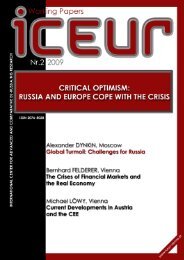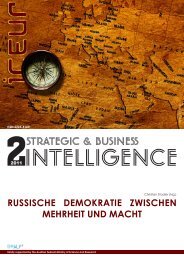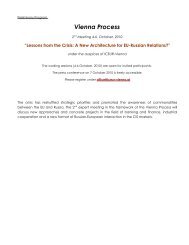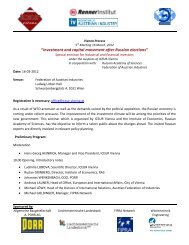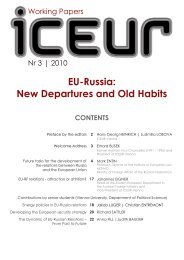International Center for Advanced and Comparative EU-Russia
International Center for Advanced and Comparative EU-Russia
International Center for Advanced and Comparative EU-Russia
Create successful ePaper yourself
Turn your PDF publications into a flip-book with our unique Google optimized e-Paper software.
INTRODUCTION TO THE TOPIC:RUSSIA – <strong>EU</strong>:WHAT CAN WE EXPECT FROM EACH OTHER?Ludmilla LOBOVAThe Iron Curtain fell more than twenty years ago. The Soviet Union suffered defeat in the Cold War not onlyideologically, but also in geo-economic terms. <strong>Russia</strong>, as the legal successor of the Soviet Union, has not becomepart of the European security system. During the nineties, <strong>Russia</strong> neither succeeded in building up a more or lessdurable coalition with the USA or NATO, nor did it enter into a stable partnership with the <strong>EU</strong>. Eventually,Europe started building up its security system based on two pillars, namely the <strong>EU</strong> <strong>and</strong> NATO. <strong>Russia</strong> wasdoomed to assume the role of an unaffiliated player, both opposing the West <strong>and</strong> cooperating with it.However, meanwhile it has become obvious that hushing up the problems between <strong>Russia</strong> <strong>and</strong> the West will notwork out in the future. Moscow is openly revising the rules of the game regarding its relations to the West,established in the nineties, a period of proceeding disintegration. <strong>Russia</strong> also resolutely determines its spheres ofinfluence, which was strikingly demonstrated during the five-day war in Georgia in August 2008.The main lesson learned from the development of <strong>Russia</strong>n-Georgian relations, is that the limits of NATOenlargementcomprising the CIS countries (Ukraine <strong>and</strong> Georgia) could not be reached.The second lesson learned from the war refers to the fact that international relations have not changed in theircore since the Cold War. Not only has the classic “strong h<strong>and</strong>” in politics remained, but, on the contrary, it hasseen an impressive comeback.<strong>Russia</strong> is again fighting <strong>for</strong> its influence over the CIS-countries, <strong>and</strong> in its attempts to do so, it benefits from theeconomic crisis in the region. This crisis will also obtain a geopolitical dimension. It is exactly the crisis thatgives <strong>Russia</strong> justification to intensify its influence in the post-Soviet area <strong>and</strong> build a strong economic basis <strong>for</strong>its own centre of power.Yet again the West is confronted with the question of how to deal with <strong>Russia</strong>. Up until now, there have been noreasons to hope that the <strong>EU</strong> <strong>and</strong> <strong>Russia</strong> could come up with an innovative model <strong>for</strong> long-term cooperation anytime soon. The countries of classic capitalism pursuing their values of political democracy <strong>and</strong> free marketeconomy have not yet found suitable schemes <strong>for</strong> cooperating with the countries of the new “authoritariancapitalism”, such as China, <strong>Russia</strong>, Kazakhstan <strong>and</strong> South-East-Asian countries, which are rising dynamically.<strong>Russia</strong> perceives itself as the global leader regarding its control over energy resources <strong>and</strong> in charge ofreallocating <strong>and</strong> shifting the global economic per<strong>for</strong>mance from the West to Asia. All this is taking place whilethe traditional West still dominates the global media space. It is a very complex task to come up with newstrategies <strong>for</strong> relations between <strong>Russia</strong> <strong>and</strong> the <strong>EU</strong>. <strong>Russia</strong>'s comeback came as a surprise <strong>for</strong> everybody,whereas, e.g., it took China three decades to boost its economy.Today, <strong>Russia</strong> plays both the role of an antagonist <strong>and</strong> a partner <strong>for</strong> the West. There<strong>for</strong>e, European politicians willboth stick to the politics of <strong>Russia</strong>'s containment <strong>and</strong> still offer <strong>Russia</strong> the perspective of fruitful <strong>and</strong> constructiverelations.However, it is important to bear in mind that <strong>Russia</strong>n <strong>for</strong>eign policy will continue to mirror domestic problems,<strong>Russia</strong>n domestic policy being primarily determined by factors such as democratic deficit, corruption, lack ofmodernization <strong>and</strong> the heterogeneous multinational population which has not yet succeeded in <strong>for</strong>ming a unified<strong>Russia</strong>n nation.– 2 –




